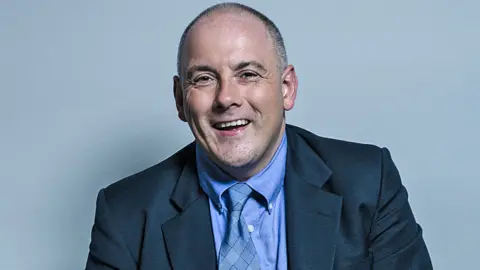'Pointless' GCSEs should be scrapped, says senior MP
 Getty Images
Getty ImagesGCSEs should be scrapped and A-levels should be replaced by a mix of academic and vocational subjects, says Robert Halfon, chairman of the Education Select Committee.
His radical rewriting of England's exam system is designed to give young people a much broader range of skills for their working lives.
The former Tory minister says GCSEs for 16-year-olds have become "pointless".
The Department for Education defended GCSEs as "gold standard" exams.
The exams taken by 16-year-olds have recently been reformed in England, with a new numerical grading system from 9 to 1.
The DFE, which shows no sign of supporting calls to scrap GCSEs, says that the most recent figures show that about 47% of young people who take GCSEs stay on to study A-levels.
Broader range of subjects
But head teachers' leader Geoff Barton said the idea of ditching GCSEs had a "lot of merit", as they belonged to an era when young people left education at 16.
Lord Baker, who introduced the exams as education secretary in the 1980s, said "the days of GCSEs are numbered".

Mr Halfon, who presented his blueprint at an event in London run by the Edge vocational education charity, wants to end what he sees as an excessively narrow academic pathway in secondary schools.
Instead of taking academic subjects at GCSE and A-level, he wants young people to have a broader curriculum, with vocational training alongside traditional subjects.
The MP is proposing a baccalaureate system to replace A-levels, with a mix of arts, sciences and vocational subjects and exams at the age of 18.
"Get rid of GCSEs, which seem to me pointless. Instead there should be some kind of assessment to show how far you're progressing," he says.
"I would rather that all the concentration should be on the final exam before you leave."

Your views:
This is an outstanding idea. I have been a secondary teacher for 10 years, and the relentless chase for GCSE grades has ruined our profession. I see colleagues suffering more and more burn out over an archaic system that serves no purpose in the modern era. Johnny, Hastings.
Robert Halfon's education makeover ideas are fantastic. I diligently pursued an academic career costing my parents, the country and myself tens of thousands only to eventually discover my passion lay in the technical and bespoke social work of hairdressing! I wish I had more choices available. Scrap the ivory tower and make it real for our children! Claire
The problem is school is still very Victorian, someone stands at the front of the class and you have to sit and listen. There is no opportunity to explore how people learn or attempt made to pique someone's interest. I think the system is broken and there is far too much pressure on children nowadays to achieve academically when not everyone is that way. It's like the old adage a fish will think it's stupid if you ask it to climb a tree. Duncan.
We moved to France in order for them to have a better quality of life and that has happened. However, a by product has been the excellent education they have received. The Baccalaureate system is, in my opinion, far superior to the system in the UK. I am speaking as an ex-grammar school pupil. Paul, France

Mr Halfon says England has been trapped in a false division between academic and vocational study - and this is failing to prepare young people for technological changes in the workplace.
"The march of the robots" and the acceleration of artificial intelligence could remove a quarter of jobs, he says.
He says there should be a royal commission on how to prepare for the impact of artificial intelligence and robotics.
"I think it's going to be dramatic. It will change the way we teach, change the way we learn and have a massive impact on jobs and skills."
Skills shortages
The former education minister says young people are leaving school without the skills needed for work, at the same time as industry is complaining of skills shortages.
But scrapping GCSEs could raise questions for secondary schools without sixth forms - which under the proposed changes would no longer have the focus of any public exams.
It would also mean, since the removal of AS-levels, young people would apply to university without having the results of any public exams.
It would also raise questions about what would happen to young people who currently take GCSEs but do not stay to take exams at the age of 18.
 PA
PABut Geoff Barton, leader of the ASCL head teachers' union, backed the underlying principle.
"GCSEs are a product of a different era when many young people left education at the age of 16, but this is no longer the case, and young people are now expected to remain in full-time education or training until the age of 18," he said.
"It would therefore make a great deal of sense to replace GCSEs with some sort of light-touch assessment which would help determine post-16 routes rather than persisting with high-stakes GCSEs."
But Andrew Halls, head teacher of King's College School, an independent school in south-west London, said it was "absolutely the wrong idea".
"This country's record in vocational training is terrible, to muddle that up with an academic qualification is a complete disaster."
"A lot of money and thought needs to be put into vocational training," said the head teacher.
"They really need to stop fiddling and changing - and make things work," said Mr Halls.
Changing technology
Alice Barnard, chief executive of the Edge Foundation, said the plans reflected the "concerns not only of parents, teachers and pupils themselves, but employers and business leaders".
"Technology is moving at such a rapid pace and change happening so quickly, we are failing young people if we do not enable them to develop the adaptability and the critical skills they need," she said.
Lord Baker, who brought in GCSEs, said the exams were now "redundant".
But he said "they won't go quietly" and warned that the government would be opposed to such radical change.
There have been previous attempts to combine vocational and academic pathways - such as Sir Mike Tomlinson's review of exams and the diplomas introduced under the last Labour government.
Mr Halfon says he would expect a "massive backlash" against such a change to GCSEs and A-levels.
A spokesman for the Department for Education said vocational options had been improved, with apprenticeships and the new T-level technical qualifications.
The government spokesman defended the value of GCSEs as "the gold standard qualification at age 16 and a passport to further study and employability".
"They were recently reformed so that their demand matches that in other high performing countries and better prepare students for work and further study."